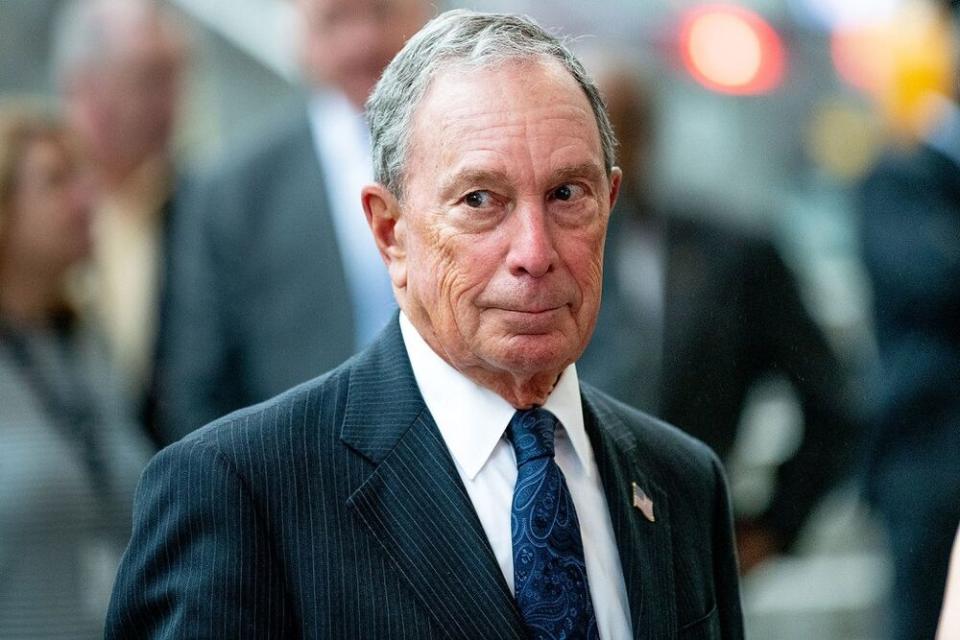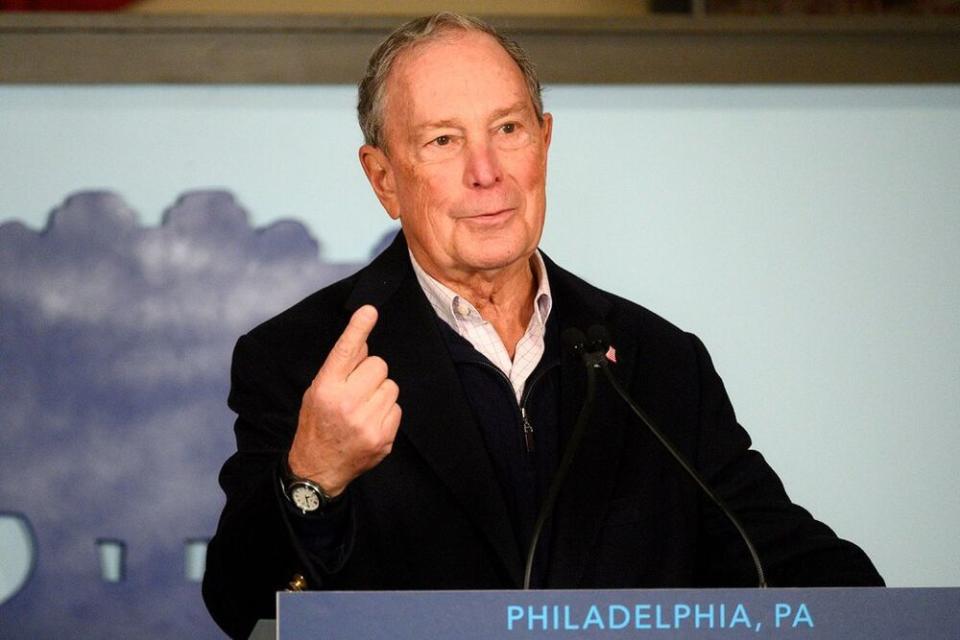Mike Bloomberg's Democratic Primary Surge & Backlash — and That Startling Debate Showdown

Mike Bloomberg‘s last-minute and seemingly long-shot push to win the Democratic presidential nomination reached its first major goal this week after the billionaire businessman and former New York City mayor earned enough polling support to qualify for Wednesday’s Democratic debate in Las Vegas.
After inundating various states with advertising to pitch his candidacy, it was the first time that Bloomberg appeared on the debate stage alongside the other leading candidates: former Vice President Joe Biden; former Indiana mayor Pete Buttigieg; and Sens. Amy Klobuchar, Bernie Sanders and Elizabeth Warren.
Wednesday’s debate was also the first chance the other candidates and the debate moderators had to question Bloomberg, 78, about his policies and his political past, including his years as a Republican.
A mogul who made his fortune with his eponymous business information and news company, Bloomberg argues he is a can-do centrist with the vast resources and management experience to beat President Donald Trump. Voters, according to surveys, are responding.
But that same success — his national polling this month has been ascendant, putting him, for now, in second or third place with Biden and Sanders — led to intense scrutiny at Wednesday’s primary debate.
For much of it, Bloomberg seemed off-balance and ill-equipped to handle the tough questioning that he likely predicted would come.
Warren, in particular, pressed Bloomberg in detail about his history of demeaning women — such as calling them “fat broads and horse-faced lesbians” — and being accused of harassment and discrimination.
In a startling, minutes-long exchange, Warren asked Bloomberg on the debate stage if he would release the women involved in those cases from their confidentiality agreements so they could tell their version of events. He resisted.
Some more of that Warren-Bloomberg exchange over past comments and the company's NDA's. And the ABC News story from back in December. https://t.co/IM2bD0IwU5 pic.twitter.com/vIyXIyb82X
— Alex Thompson (@AlxThomp) February 20, 2020
There were other questions about his record.
Bloomberg, who served three terms as New York City’s mayor from 2002 to 2013, has been criticized by some of the same Democratic voters he’s now trying to persuade for championing a stop-and-frisk policy in N.Y.C. that unfairly targeted people from minority groups during his tenure as mayor.
Recent audio released last week also opened up the candidate the blow-back after it caught Bloomberg appearing to blame the 2008 housing crisis which led to the Great Recession on banks’ inability to continue discriminatory loan practices that also targeted minority groups and those living in low-income areas — a practice known as “redlining.”
Bloomberg, who for years defended stop and frisk, apologized for the policy late last year while speaking at a predominantly black church in Brooklyn.
“I was wrong and I am sorry,” Bloomberg said, according to The New York Times.
His history of comments about women was denounced by his campaign in November, in a move to distance himself from that controversy.
“He believes his words have not always aligned with his values and the way he has led his life,” an aide told the Times. Earlier this week, 2019 comments he made resurfaced in which he called transgender people “some guy wearing a dress” and “he, she or it.”
In a statement to PEOPLE this week, a Bloomberg spokesperson cast his campaign as one with major momentum, despite criticism.
“The Bloomberg campaign is seeing a groundswell of support across the country,” the spokesperson said. “Since Mike launched his campaign 13 weeks ago, he’s met with voters in 25 states and 62 cities. Qualifying for the debate is the latest sign that Mike’s unifying vision and his ability to defeat Donald Trump is resonating with more and more Americans.”
The spokesperson added that Bloomberg prepared to face the other candidates on Wednesday: “Because we’re doing well and because we’re rising in the polls, everyone is attacking us, frankly.”
“Trump and his allies are parroting and promoting the attacks from Bernie Sanders and his allies, which you have to wonder is a little interesting on what strategy is there in terms of Trump people parroting Bernie Sanders’ attacks against Mike,” the spokesperson said earlier this week. “We are expecting he’s going to get hit from all sides.”
RELATED: Mike Bloomberg Campaign Is Paying Social Media Influencers to Post Political Memes Online

Democratic candidates have also decried Bloomberg’s massive wealth, which has allowed him to self-fund his campaign and spend unprecedented amounts in a nationwide ad blitz.
“I’m a philanthropist who didn’t inherit his money, but made his money, and I’m spending that money to get rid of Donald Trump, the worst president we have ever had,” he said at Wednesday’s debate. “And if I can get that done, it will be a great contribution to America and to my kids.”
Bloomberg also sought to draw contrasts between his story as one of American success versus the proposals of Sanders, which he dismissed as “communism.” (A “cheap shot,” Sanders responded.)
After announcing his presidential bid in November, Bloomberg erupted with an enormous ad buy that has topped any other candidate’s spending — by far.
Ahead of “Super Tuesday” on March 3, where 1,357 delegates are up for grabs in 14 states (1,991 are needed to win the Democratic nomination), the Los Angeles Times reports that Bloomberg has already spent more than $124 million in ad buys.
Sanders, who currently leads the Democratic race with Buttigieg, has spent less than $10 million.
That spending is part of a highly unusual strategy to win the primary: Bloomberg, acknowledging he was entering the race much later than the other candidates, is not on the ballot in the first four states to vote. Instead, he’s tried to use that time to focus on building his support in the states that vote on “Super Tuesday.”
Bloomberg has advertisements on television, radio, podcasts and more across the country — even paying for a $10 million advertisement during the Super Bowl touting his work to reduce gun violence.
“Mr. Bloomberg, like anybody else, has a right to run for president,” Sanders tweeted on Monday. “He does not have a right to buy the presidency.”
RELATED: Michael Douglas Makes First Public Appearance at Mike Bloomberg Event Since Father Kirk’s Death
Mr. Bloomberg, like anybody else, has a right to run for president. He does not have a right to buy the presidency.
— Bernie Sanders (@BernieSanders) February 17, 2020
We’re headed to Nevada! Our campaign is seeing a groundswell of support across the country, and qualifying for the February 19 debate is the latest sign that @MikeBloomberg’s plan and ability to defeat Donald Trump is resonating with more and more Americans. https://t.co/TrPLLBw7T7
— Kevin Sheekey TEXT MIKE TO 80510 (@ksheekey) February 18, 2020
A recent Democratic Party rules change allowed candidates like Bloomberg to qualify for debates by earning a certain percentage of support in four specific polls, according to The Washington Post.
Candidates had previously needed 130,000 individual donors to qualify for a debate spot, according to Politico.
Bloomberg qualified for Wednesday’s debate after earning 19 percent in a recent national NPR poll, in second place behind Sanders.
Sanders and Bloomberg — who represent two very different ideologies within the Democratic Party — have already sparred online and in the media. Sanders, a democratic socialist who heavily campaigns on balancing out the nation’s wealth, has painted Bloomberg as a billionaire candidate who’s trying to swoop in and “buy the presidency.”
The 78-year-old Vermont senator ramped up the criticism this week, as Bloomberg began to gain momentum in national polls.
“Together, we are going to end the greed of the billionaire class,” Sanders tweeted Monday.
Earlier in the day, Bloomberg’s campaign sent out a news release that aligned Sanders’ criticism of Bloomberg with President Donald Trump.
Sanders replied by tweeting out a photo of Bloomberg and Trump golfing together.
President Trump, 73, has jumped into the fray as well, relishing a new target of his notorious social-media mockery. Bloomberg became “mini Mike.”
RELATED: Tim Gunn Jumps Into the 2020 Election: Why He’s Endorsing Mike Bloomberg — and Joining the Campaign

Bloomberg has been also criticized for flip-flopping between being a registered Republican and (currently) a Democrat.
He switched from the Democratic Party to run as a Republican in 2001 and stayed affiliated with the party until 2007 when he switched to become an independent. He again switched back to become a Democrat in 2018.
Outside of his rising support with polled voters, Bloomberg has also marshaled a number of celebrity endorsements, including Judge Judy, Academy Award-winning actor Michael Douglas and fashion icon Tim Gunn — all of whom cited Bloomberg’s tenure as mayor as one of the main reasons for their support.
Gunn, 66, also mentioned Bloomberg’s long absence from the campaign as a potential bonus.
“He hasn’t been part of this squabbling and bickering,” Gunn told PEOPLE last month, noting that Bloomberg launched his campaign nearly a year later than most other candidates. “Now he can just ride in like a knight in shining armor.”
But Wednesday’s debate gave Bloomberg’s armor its first test as the field of Democratic candidates turned their attention to the wealthy newcomer who so far has spread his message to voters largely through carefully crafted ads and online messaging.
“$60 billion can buy you a lot of advertising, but it can’t erase your record,” Biden said on Sunday’s episode of Meet the Press, citing a number of things he anticipated debating, including redlining and stop-and-frisk policies. “There’s a lot to talk about with Michael Bloomberg.”

 Yahoo News
Yahoo News 
